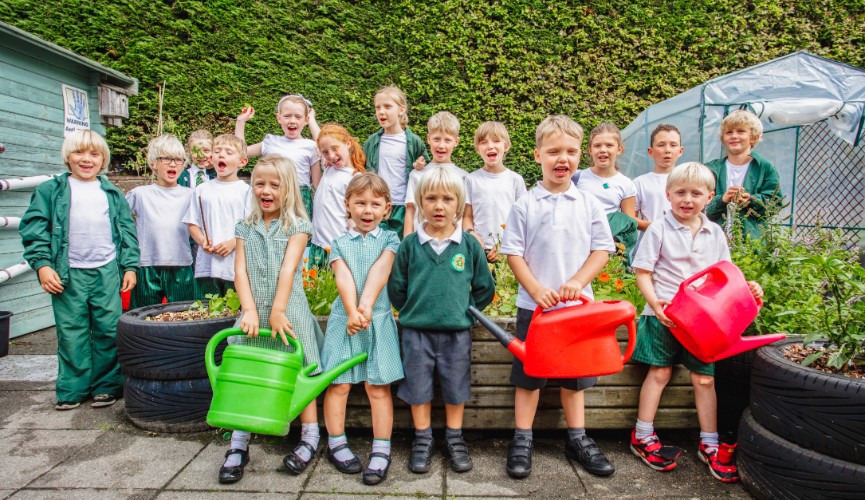Arrive at most island primary schools at 3pm on a Friday and everyone has gone home for the weekend. But this is not the story for St John’s Primary School in Jersey. After hours, it is a hive of activity with more than 20 children planting, picking and eating an array of fruits and vegetables.
Thanks to the 100 Day Community Challenge , the school’s gardening club are transforming their outdoor space. They’re adding colourful water butts, more raised beds and redesigning an area outside the year six classroom. The plan is to add a new table and benches to the area, install some planters and create a ‘growing wall’, so the area is much more inviting for the children to work and play.
The gardening club is run by parents and it all started with a simple honesty box. Since launching in the spring, the club has continued to grow and benefit the community.
Sarah Huelin, one of the parents behind the club, said:
‘After the honesty box successfully functioned for a time, the PTA thought it would be a really nice idea to create a gardening club. We wanted something the children could actually contribute to, whilst learning and having fun in an outdoor environment.’
The school playground is always open and the whole community has access to the honesty box. All the proceeds from the box go back to the PTA.

What is the 100 Day Community Challenge?
St John’s School is one of five projects in Jersey and four in Guernsey taking part in our 100 Day Community Challenge. Each project was given £1,000 and 100 days to complete it.
With projects due to be completed on 11 December, all the children at the gardening club have been very busy clearing, building and decorating their school garden.
Why is the gardening club so important for the children and the community?
Sarah said: ‘Understanding the complexities of how produce grows gives children a better connection to the natural environment and induces a sense of wonder, appreciation and excitement over it.
‘Children definitely value their food more when they know all the effort it takes to grow it.’
A range of vegetables and fruits are grown in the school grounds including strawberries, courgettes, onions, lettuces, radishes, tomatoes and much more.
The initiative encourages the children to try new things and learn the process of growing from planting the seed to picking and cooking.

What will it mean to the children once the 100 day challenge is finished?
Sarah said: ‘Thanks to the money we received from the Co-op, the gardening club will be able to function better as there will be more available space at the school to plant.
‘This will help us greatly as we had more than 20 children attending last term.
‘We are hoping that each class will be able to take ownership over a part of the new growing spaces. We want growing and nurturing the plants and produce to become part of the children's daily routine.’
Want to know more about other projects involved in the challenge? Watch the videos.






